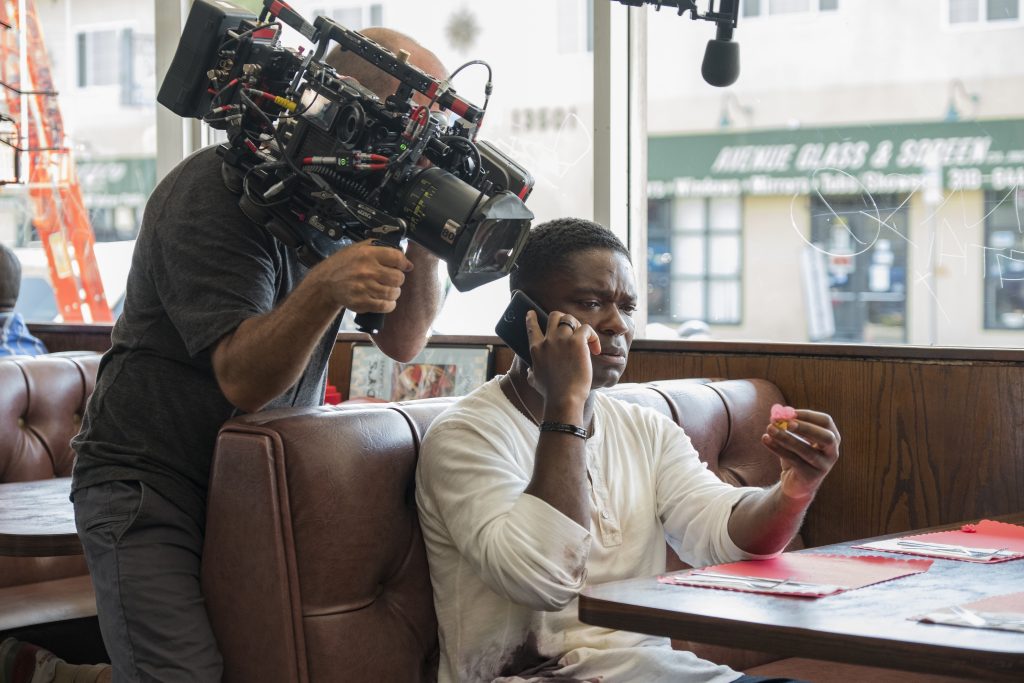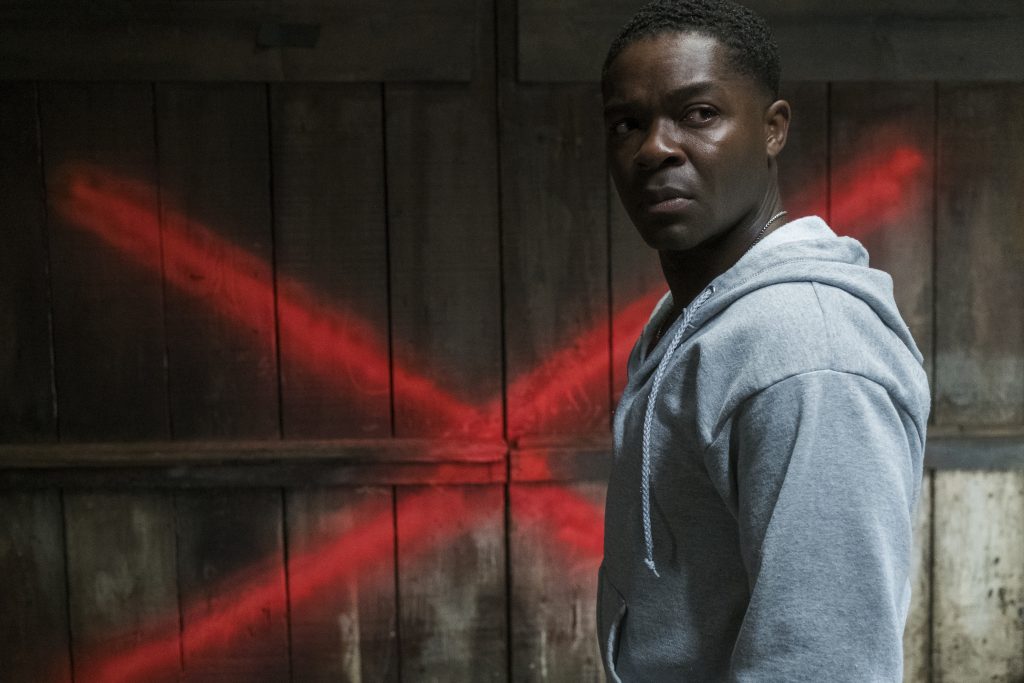Don’t Let Go is a supernatural thriller the follows police detective Jack (David Oyelowo) as he struggles to deal with the tragic murder of his niece Ashley (Storm Reid) and the rest of her family. Things take a turn when he receives a phone call from Ashley but it’s her from two weeks in the past. Even though he has no idea how it’s possible, Jack sees it as an opportunity to find out who the killer is and hopefully prevent his niece’s murder. We sat down with David Oyelowo to talk about the film and how it grounds the sci-fi elements with emotion, and his passion for original ideas.
From a festival run to getting here now, I understand that the film was originally written for white actors? Can you talk about what you were able to bring to the character and what it was like to wrap this cast around some cast members of color?
David Oyelowo: Yeah, it was originally set on a farm in Ohio and I guess the idea was the murder had to be one where by gunshots happened and the police don’t immediately come. When they came to me, I loved the concept, but I just couldn’t picture myself on a farm in Ohio. So we were thinking where else could we set this that feels specific to someone like me but also an environment where potentially gunshots would ring out and the police wouldn’t immediately come. So we thought, okay, let’s try shooting it in LA. Where would that be? I guess that would be the case in somewhere like South Central. So something like that. And so that gave us the opportunity to then build out this cast among a predominantly African American demographic location, which was South Central Los Angeles. That’s how we got a Storm Reid, Mykelti Williamson, and Brian Tyree Henry in this film, which is something I’m really proud that we were able to do.
Talk about the synergy between all that extraordinary talent, because you come from British theatre and Brian also comes from theatre. So what was that like being around all this extraordinary talent?
Oyelowo: Well as does Alfred Molina as well. I think the strength of the story – you can always tell how good a script was by the nature of the talent it attracts. This concept; we love the genre aspects to it, but it also is a very relatable story as a human being. If you have anyone in your life that you love, you can relate to the idea of wanting to save them, wanting to protect them, wanting to reach through time to somehow change bad things that could have happened to them. It was just a huge privilege getting to work with this cast, because it’s like tennis, you play someone better than you they raise your game.
What I found most interesting was the whole uncle/niece relationship. We don’t really see that too much in film. Usually it’s father/daughter. How did that influence your performance?
Oyelowo: It’s one of the things about the script that I most enjoyed because I’m a believer that family can sometimes transcend the people who, whether you like it or not, they’re your immediate family. With an uncle and niece having this close of a relationship; to a degree that’s choice. Jack could have chosen to be a distant uncle; “my brother’s a ne’er-do-well. You guys figure it out.” But he’s choosing to be in his niece’s life. To me that’s actually what true love is; not just the fact that you have to look after someone because they’re your child but you choose to. I think that’s partly why the film, that emotional core to the film really resonates because with these two people it’s clearly love. That means they’re prepared to be so self-sacrificial towards each other.

I’m curious to the filming process itself. So much of the film is you talking on the film to Storm Reid. What was it like on set? Was she always there to go through the lines with you? Was it just you talking into a phone with someone off camera? What was that process like?
Oyelowo: We knew that the film would live or die by how much you felt that connection between the two of us and so we made a pact that we would always be on set with the other person no matter who had the cameras on them. So I was always there for Storm’s stuff and she was always there for me just so that we felt that connection. We were within proximity of each other. I would literally be outside the room on a phone doing the scenes with her, but between scenes we would be able to be together. We were being directed by Jacob Aaron Estes, our director, as if we were in a scene together so that that point of connection didn’t feel dislocated somehow. It felt lived in as opposed to something that we sort of cobbled together afterwards.
I think that helps with building the relationship in the film. It kicks pretty much immediately and within the first 10 minutes everyone is already dead and things are going.
Oyelowo: Yeah, we wanted it to be a ride for people so we were like, “how do we establish this relationship early so then we establish the tragedy early so that the bulk of the film is wanting, willing, these two people back together.” If we didn’t get that connection right out of the gate I don’t know that the audience is going to be feeling that way. Thankfully it seems to be something that we managed to do.
How much of what you did on screen for this film reflect your own relationship with your family? You’re a father, and technically you’re like a father-figure in this particular role. How much of this role reflects your actual real life as a parent?
Oyelowo: 100% is why I wanted to do it. It’s because I understand that paternal instinct to protect. Even though I love the genre elements; the time travel, the supernatural thriller element, the detective element, the who-dun-it element of it all, the action element; what really kept me interested and grabbed my attention was knowing that I as a person would do anything and everything I could to protect my own children.
Another thing that the film did a good job explore was the whole trauma and PTSD of losing your entire family. There were moments were I was still second guessing whether or not he was really talking on the phone with his niece or was it all in his head as a way to deal with his trauma. How did you find that balance between the two? I’m sure you had those talks while making the film.
Oyelowo: We did, we did. One of the things we were mindful of was that we didn’t want to get bogged down with explaining the time travel element so we chose to have a character who’s also confused. “Is this real? Am I going crazy? Are these the effects of grief?” And then he gets to the point where he goes, “I think this may be real.” Then he goes, “Okay, whether it is or not, I just know that I’ve got to utilize this opportunity to try and get my niece back.” All of those elements I think are what make it not your average time travel movie. The fact that like you say, is it PTSD? Is it trauma? These are all authentic, believable, and real emotions that one could feel so that by then you’re on the ride. You’re not questioning the film as much.
If definitely doesn’t get bogged down by the rules of time travel and how it’s working.
Oyelowo: Exactly. That would be a very different kind of movie. I think the emotional side of it would get snuffed out by all that more heavy intellectual stuff.
The film was originally titled Relive, which is a great title as well. Why did it change to Don’t Let Go?
Oyelowo: We took the film to Sundance and we learned some valuable lessons. Because it’s a time travel film, I think we got bogged down actually ironically the logic and the sci-fi elements of it, and so Relive felt like a more appropriate title for that version. But we learned some things from showing it to an audience, getting some reviews, and thinking there are things we could do to bolster this story. We changed the ending. There are several things within the film that we also changed. We reintroduced red herrings that we had taken out because we wanted to be more clear in a sense. I think we weren’t giving the audience enough credit from an intelligence point of view. So when we put those things back into the movie, the movie became more emotional and so therefore Relive didn’t feel quite right. Don’t Let Go felt like a more appropriate title. And it it definitely a better film now than I think it was at Sundance. That’s another great thing about working at Blumhouse. They are so supportive of the creative that even after being at Sundance they allowed us to go back and improve the film so that’s why the title changed.

How have you gotten stronger as an actor in doing this role?
Oyelowo: I’m always looking for roles that scare me, that make me question whether I will be able to do it or not. I definitely was scared to put myself in the emotional headspace of someone who had lost a young family member because I have four kids. I couldn’t escape having to contemplate what that would feel like for me. That is not a space you want to be in for too long. I am a braver actor having put myself through that, and that’s what you’re looking for whether you’re doing theater, or you’re playing a historical figure, or you’re playing the kind of role that you’ve never played before. You’re looking to be in places of discomfort. Muscle is built under pressure. You put pressure on yourself and it means that you become a stronger performer going forward.
You also did Les Misérables for Amazon, and it’s not a musical this time like we’re used to. What was that like alternating between doing this but then doing one of the most quintessential live theatrical experiences?
Oyelowo: That to me is one of the things I feel most blessed about and most proud of in terms of my career thus far is the myriad of opportunities I’ve been afforded in terms of their breadth. After I did Selma I got offered every Civil Rights movie under the sun, and I had to work very hard to not get stuck in that mode. Saying no a lot helped and that’s what eventually afforded me to keep on. I did a comedy for Amazon called Gringo. I got to do Les Misérables. I’m getting to do this. I’m getting to do an African love story in the United Kingdom. All of these different things are what I also admire in the actors that I idolize in a sense. You never see Daniel Day Lewis doing the same thing twice, and that’s kind of the career I aspire to.
Along those lines, you have your own production company. You got your naturalization three years ago. How are you going to utilize your voice, your presence, and this opportunity as a producer of film to tell stories along those lines or even just to attack the issues like we’re seeing right now in the news?
Oyelowo: Well in a subtle way that’s what Don’t Let Go is. There is a dominant culture at play here that we have seen rise in a way that is scary. I think the way to offset that is to show that we are more alike than we are different. I love that Don’t Let Go is not centered around race, but it’s something that anyone and everyone can relate to, and I truly think the way to break down prejudice is for people to recognize that they are more like people who don’t look like them than they may realize. The other thing for me is to help nurture talent that may otherwise may not get the level of representation that I saw when I was younger. When I was younger there wasn’t an opportunity like this for a Storm Reid. Natalie Portman was in The Professional but Storm Reid wasn’t in Don’t Let Go. Some of the stuff that my production company is doing, whether it’s the film that I just directed called The Water Man, I have a wonderful young actor called Lonnie Chavis who’s just phenomenal as the lead in that. Again, that was a film that was originally not written as a young black kid, but I have Lonnie Chavis playing that role. I did a film called Come Away that I also produced which is an origin story of Alice and Wonderland and Peter Pan, and my kids in that, Alice is black, Peter is black. Myself and Angelina Jolie have these mixed race kids in that film that otherwise would not be the case. That’s what I’m looking to do – to create worlds that look like the world I inhabit as opposed the world that I pervasively got to watch from a distance when I was that age.
You were the first black actor to play an English monarch. What does that do for your psyche and just the level of expectation that you bring to a character on stage or on screen?
Oyelowo: Whether I like it or not, I’ve been afforded the opportunity to do things that have been groundbreaking. I didn’t set out to do that. I didn’t even know I was the first actor afforded that opportunity when I was given it but it happened. And then it happened a lot more after the fact. Selma came along and it started #OscarsSoWhite, which became something that re-calibrated how we look at representation in Hollywood. I didn’t ask for it, we didn’t set out to do that with the film, but it’s been really amazing to be a small part in what have been cultural shifts and to leave the world different than I found it is something that I always aspire to do. I’ve just been very fortunate to be part of some projects that have managed to do that.
What other projects do you want to embark on?
Oyelowo: For me it’s about things we haven’t seen. I love a big tent pole, but I love original stories. I’m a true believer that not all the stories have been told yet. We don’t have to keep going back to the well to dredge up what’s already been made and reboot them and then have the guy who was the hero now playing the father of the hero. All of that stuff, I think kinda suggests that we’re losing some of our creativity. For me personally it’s about new stories with new voices by people and for people and with people who have been underrepresented traditionally speaking in all genes. That’s what I’m always looking for.
What do you hope audiences get the most out of the film?
Oyelowo: I hope they see themselves. I hope they see the part of themselves that maybe when they lost someone and they were in that space of “What would I have done differently? Could I have saved them?” They actually get to watch a character who gets a second chance. And anyone who’s loved anyone I think will be able to relate to the idea of wanting to be able to protect them, to save them, to keep them safe. Those were the things that drew me to it. It’s a ride of a movie as well, but if you have loved anyone or are loved by anyone, I think it’s a film for you.
Don’t Let Go is now playing in theaters nationwide.







